#interestingly this scene seems to leave things open
Explore tagged Tumblr posts
Text
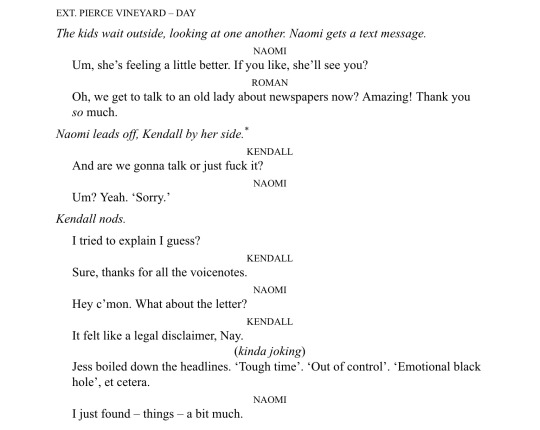
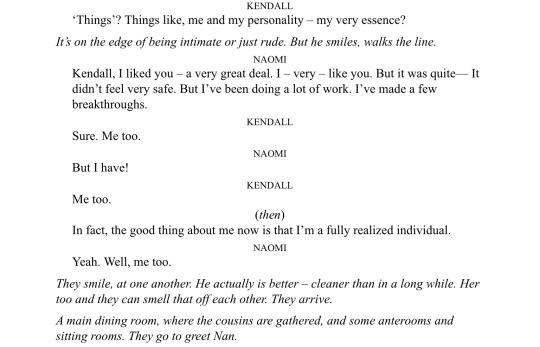
Kenaomi insight! 💕
#a fully realized individual#wow so they had definitely been in touch a bunch!#I want to know everything about this!#interestingly this scene seems to leave things open#her saying ‘but I’ve been doing a lot of work’#I still say they could get back together after the finale#from her outside perspective nothing bad even happened with him#in season four#like she’d know he tried to stay CEO but I mean she wouldn’t care either way in regards to her feelings for him#scriptposting#kendall roy#succession season 4#succession#kendall x naomi#naomi pierce#kenaomi
146 notes
·
View notes
Text
Mizu’s Affinities with Trans Women
While many folks have drawn parallels between Mizu’s life experiences and those of trans men (AFAB living as a man, wearing a binder, deepening her voice, adopting masculine mannerisms, etc.), an under-explored topic is her affinities with trans women.

From as early as Mizu can remember, she was forced to hide her femininity and live as a boy. In flashbacks, we see her “Mama” forcefully shaving her head, saying she “must be a boy, always a boy,” while she sadly clutches her fallen locks of hair. Mama’s supposed death in the hut fire only further cements in her the importance of living as a boy for her safety—to protect herself from the “bad men”—and it also leads her to seek vengeance, which requires her to live as a man (as Madame Kaji says, "under the law, revenge is a luxury for men like you"). In Mizu’s conversation with Mikio, she also confirms that she didn’t want to live as a man but had no choice but to do so because of the bad men and her revenge.

Indeed, when Mizu is briefly given the opportunity to live as a woman, she takes it. Even before her marriage to Mikio, when she was reunited with Mama, she chose to dress like a woman. She no longer needed to live as a man since (as Mama explains) the bad men believed she died in the fire, and she was no longer on her revenge quest. When Mama exhausts Mizu’s savings, it’s notable that Mizu agrees to the arranged marriage instead of going back to living as a man to make money.

Similar to trans women, however, Mizu was not socialized to live as a woman. She initially struggles to conform to womanly roles in Edo society, like acting appropriately submissive to her husband, moving elegantly (she’s shown to be clumsy while doing chores), and cooking meals. According to the Lead Character Designer, they intentionally made her women’s clothing fit awkwardly given her height. She is also self-conscious of her looks and how she does not fit the feminine ideals of her times. She’s used to people calling her ugly (including Mama, Swordfather, and Mikio). In a cut scene from Ep. 4, Mizu tries to put her hair up and gauge whether she could be considered attractive but concludes that she cannot. She exhibits jealousy toward Akemi (more on that here) for how she epitomizes feminine beauty and privilege and judges her for not appreciating the fact that she can “have anything she wants,” including the epitome of prizes for Edo women, a marriage into the Shogunate.

Mizu’s marriage with Mikio also exhibits parallels to the safety challenges trans women can face in romantic relationships. Despite her initial struggles, Mizu is eventually able to win Mikio’s heart, in part by suppressing her more masculine attributes. For example, she pretends to not be able to throw the knife to cut down the apple. But for a little while, she is able to live a happy life, as a woman.

Her mother told her to hide her past, but she eventually trusts Mikio enough to reveal that she was raised as a boy and lived as a man. And not only any man, but a man dedicated to the most masculine Edo pursuit of swordsmanship. The fact that Mikio seemed not only open-minded about this but eager to see “all of her,” leads her to show him her masculine side as well. Unfortunately this backfires spectacularly. He rejects her, calling her a monster. Interestingly, Mizu intuited the connection between his rejection and her gender presentation. She tried to smooth things over by putting on makeup and her wedding kimono to use her femininity to soften his heart and implicitly show her willingness to suppress her masculinity and commit wholly to being his feminine wife, but it was already too late. He leaves her to be killed by the armed men (he was also most likely the one who ratted her out: see here).

The deaths of Mikio and Mama not only mark the end of her relationships with them but also the end of her life as a woman. She concludes she has nothing left in life but her revenge quest, which necessitates her living as a man. For a brief moment, she thought she could be herself and be loved, but that dream came crashing down with betrayal and tragedy.

All of this is why I’m personally a huge sucker for feminine Mizu moments. I find them quite subversive even though she is AFAB. I hope in Season 2 she’ll be able to spend at least some of the time living as a woman since she won’t have the bounty on her head to worry about and it might actually be easier for her to present as a woman in London accompanying Fowler. Also, it would be empowering for her to explore leveraging her femininity as power rather than having to constantly suppress it. Here’s to kick-ass Mizu in a dress! 🍻

414 notes
·
View notes
Text
Come Back to Me.

As the first scene opened, my very initial reaction/feeling was overwhelming relief. Is that a weird feeling to feel first thing? With all that's happened these past few weeks, this seemed like this is finally a tangible thing to fight back with. I don't know if that makes logical sense but I guess I have been angry and frustrated and feeling helpless.
The party scene that opens the MV and which he returns to toward the end, perhaps this symbolizes his chosen career/life? At the beginning, he's tired and over it... "leave me alone, I need to step away." So he gets up off the couch. Yet the lyric says "I told you I'm fine, staying good..." (He has told us several times after Festa 2022 that he's fine, he's good.)
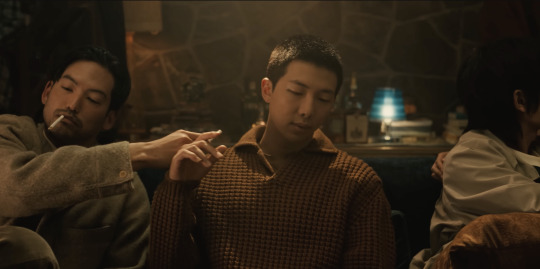
He stares (with longing?) at the mysterious door with three little glass windows.
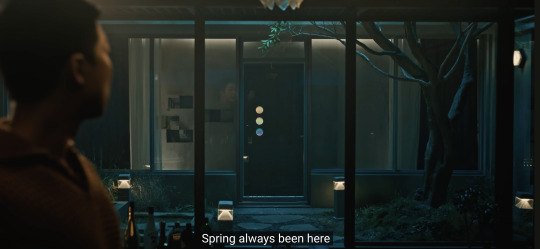
"Spring's always been here." I know the lyric on the MV says Spring, but he clearly says "spring's always been here."
Then he is interrupted again so he strides away from the party and suddenly he's in his bathroom with his little family who are brushing their teeth.
The ideal scenario. Nice, perfect little smiling family, perfect little home.
The door to the bathroom has four little windows on it...
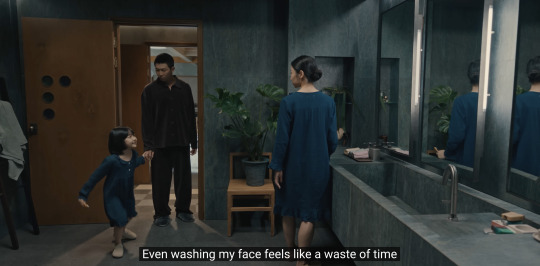
His little girl (Namjoon is a girl-dad) pulls him into the bathroom to join her and her mom. He is confused.
Lyric: "I forgot to shower, 세수할 시간도 아까워 or sesuhal sigando ahkkawuh" and translates to "even washing my face feels like a waste of time." He made the Korean lyric rhyme with the preceding English lyric.
Why just this line in Korean? The concept of "face" has a specific cultural meaning in Asia which includes Korea (but is not limited to this). Everyone's heard of "saving face", to save your honor or protect from humiliation. Its more than just a sense of honor though. There is much more to it, if you want to read something, here is one article that attempts to explain the cultural significance of it.
In the context of these lyrics, I think he means, as a Korean, he thinks keeping his face clean is a waste of time.
If we were to think of it as his attempt to keep his idol image clean, to be the kind of person everyone thinks he is, to uphold the honor of everything that some want to put on him and make him represent... that's gotta be a huge amount of pressure and its a waste of time for him to try to be the perfect man in his perfect home with his perfect family. Because he's not perfect. "You don't have to be the anything you see....Trying not to be that something in this sea."
As we've seen recently, what a challenge it would be to constantly be trying to uphold such a perfect image in the midst of so much shit being thrown from all directions from multiple entities.
Moving on.
He goes through another door and has to duck because something is being thrown at him.
The imperfect relationship. Conflict, anger, a lot of turmoil. The room is a total wreck. He attempts to diffuse the situation but she's mad, accusatory. The lyric he's singing: "I told you I'm fine tonight, staying good." Obviously not. She is dressed in some sort of cocktail dress, a little bit of glamour within this chaos.
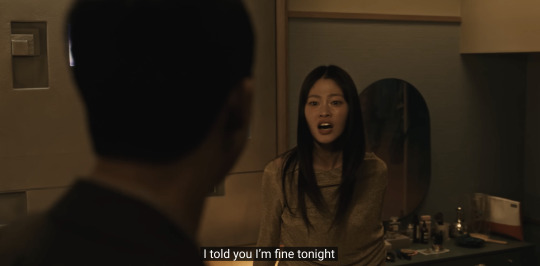
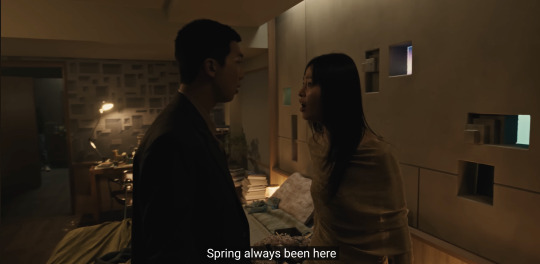
Interestingly, the walls throughout this MV usually have some sort of box-like shapes embellishing them. Or the furniture is angular/rectangular. The wallpaper in this room looks like a maze. Each of these rooms could be considered a box.
They struggle, she grabs a lamp. He runs. The door to that room has no little round windows on it.
The hallway he walks down is lined with doors, some open, some closed, some with little round windows in them, some without.
He goes into an open door and then immediately comes back out, the woman in the previous room following, trying to pull him back in. What does she represent? Personal relationships? The aspects of his life that are tempting but toxic?
He tries to open the door with three windows. He cannot. It is locked to him. He keeps running and finds himself suddenly in a baby crib?! The wood bars resemble a jail cell.
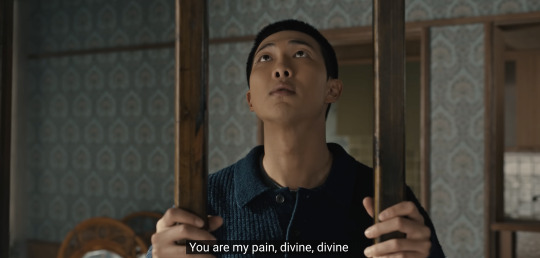
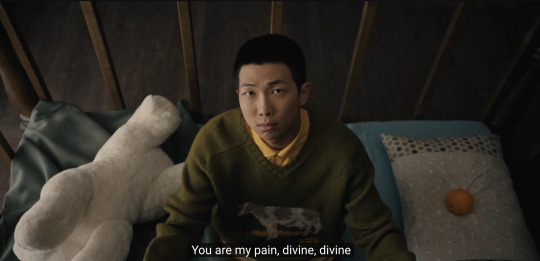
What's up with the orange on his pillow? Oranges are given as gifts in Korea for good luck. The parents peering over the top of the crib entice him to come to them.
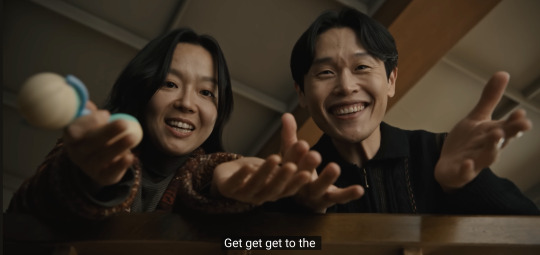
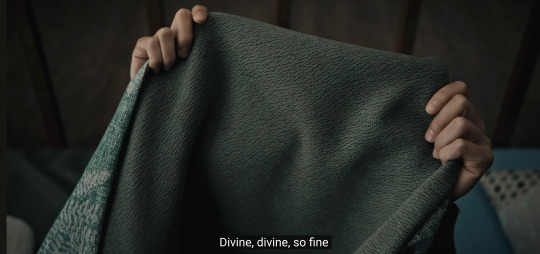
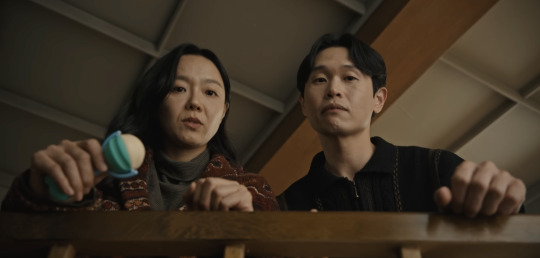
"You are my pain, divine, divine, get, get, get to the divine, divine, so fine." This part has stumped me. He's being treated like a baby, or he feels like a baby. Parents looking down at their baby boy... he is unfazed at their adulation... he covers himself with a blanket to shield himself from their attention, they are disappointed and leave him be by walking away... the lyrics: "You are my pain divine, divine, get, get, get to the divine, divine, so fine." Could it be the celebrity life he leads, the perception he's young and naive, a baby? Trapped in a box, not able to get out on his own terms? Endure the pain of it all in order to get to the divine of it all? I don't know.
When he uncovers himself, the blanket has turned into a big leaf from a houseplant, and. he's in a nice room which resembles his real home.
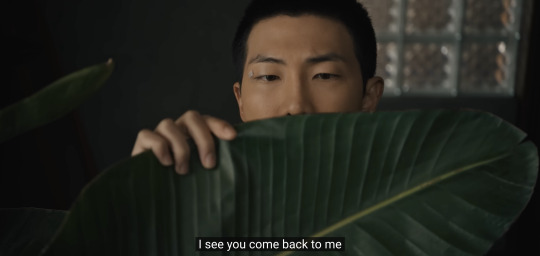
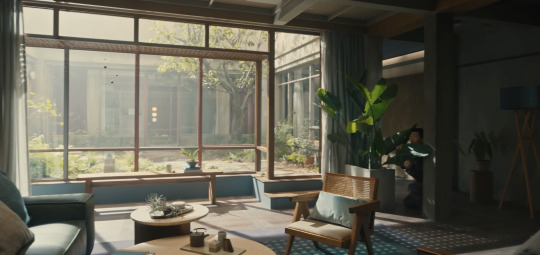
A different woman enters the room, seemingly searching for something. She's dressed in a drab looking dress.
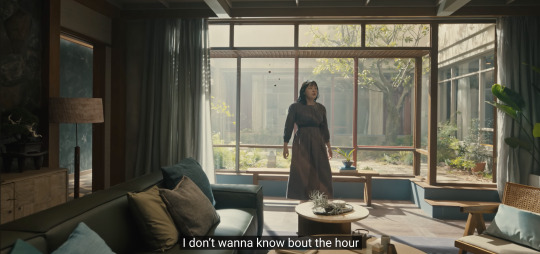
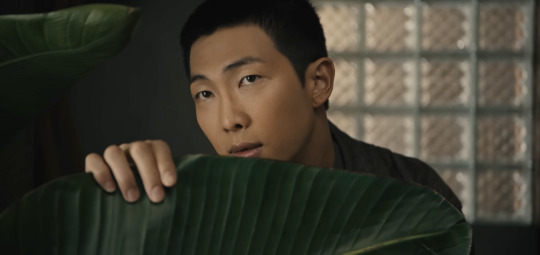
He contemplates her while she is still in the room.
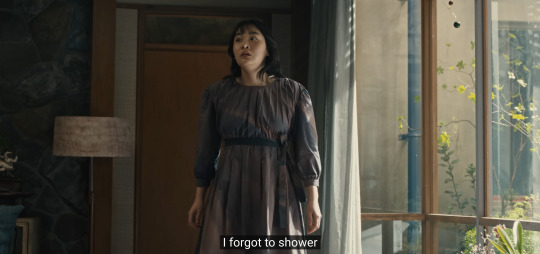
She doesn't see what she's looking for and leaves the room hurriedly.
The lyric is a repeat of forgot to shower, waste of time washing my face.
He follows her.
She doesn't seem to be aware he is there. He senses her but just misses seeing her slip away.
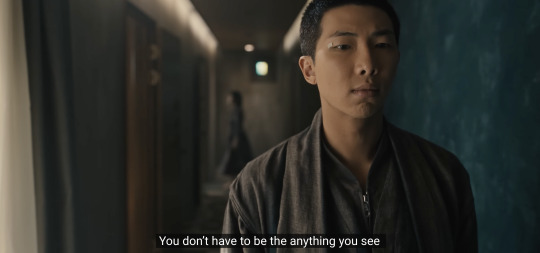
And he seems to make a circle and ends up back in the room he just left. And he turns around, and comes face to face with himself.
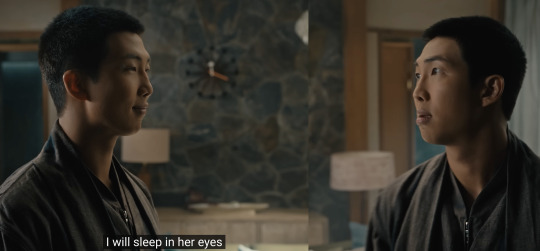
"I told you I'm fine tonight, Spring's always been here, I will sleep in her eyes." The camera pans to his other self and back and he's turned into the woman who was searching for something. They found each other.
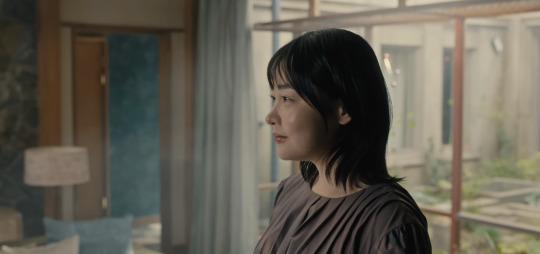
Who does she represent? His alter-ego? His life? The balance he's been searching for? Does she represent us? his fans? or maybe all the people who support him and he depends on. She represents his center, his stability?
When they find each other, they are happy. There is a beam of sunlight that quickly moves across the wall behind them when they go to sit on the couch. They don't sit close to each other. Very platonic. Does she represent happiness and comfort, his guiding light?
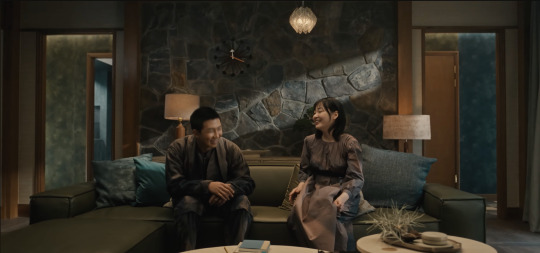
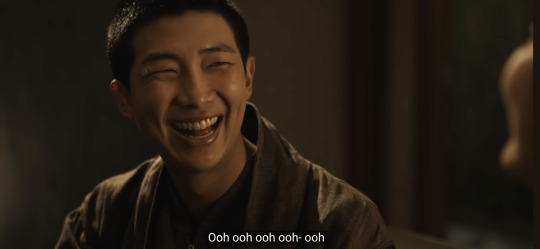
Once they connect, his smiles are so big, he's laughing, he's happy once again and he returns to all the other rooms happy, settled, content even.
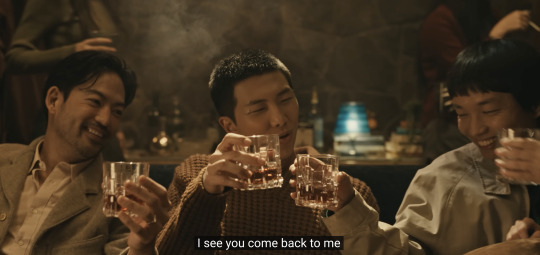
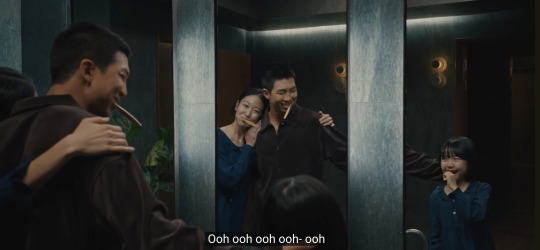
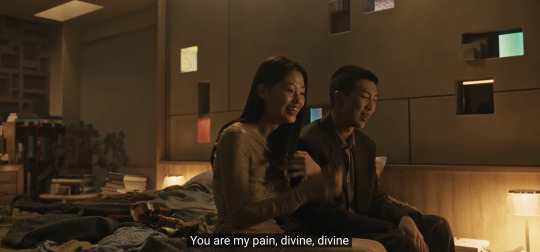
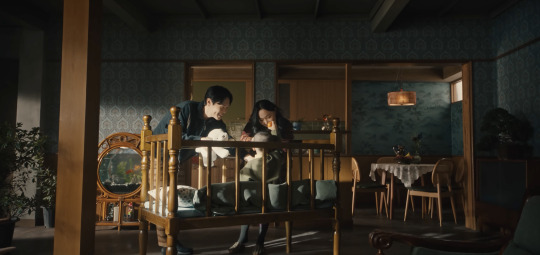
Hard to see but the baby in the crib who represents RM, is holding up the orange to his mother.
"I see you come back to me, you are my pain divine. You are my pain divine, divine." The last sentence repeats over and over as he rises and sees the happy sunlight woman again, beckoning him to come to her and he nods as if he knows its time to go with her.
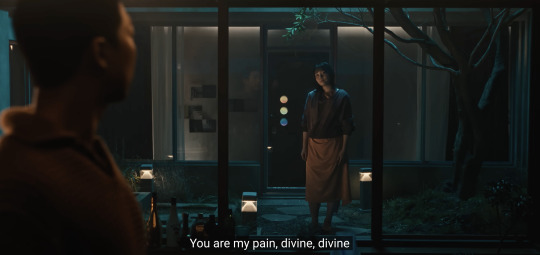
He goes to her. As soon as he enters that atrium where she is standing, the sun comes out and we see both of their clothing has changed, he in a hanbok-like outfit and she back in the dress we first saw her in. The outfits are made of similar material and they are both barefoot. I am sure being barefoot has some cultural connotation. Getting back to basics, to a natural state perhaps? Simplicity.
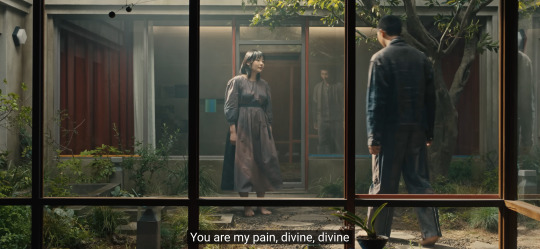
"You are my pain, divine, divine" keeps repeating and "I told you I'm fine tonight, staying good, Spring's always been here." He is reassuring, perhaps indicating he knew he had to take this journey of self-discovery, or self re-discovery knowing there were those who supported him, the Spring would always be there no matter how challenging it is.
She seems to ask if he's ready and he takes a deep breath and they both go through the door and the light becomes brilliant.
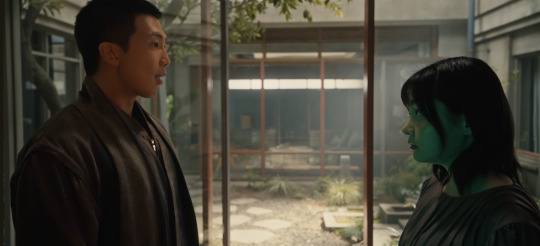
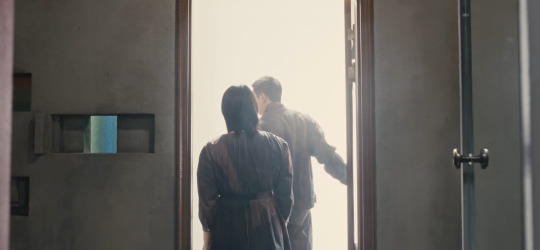
As the camera pulls back while they walk amongst the corridors, we see a vast maze of similar rooms.

Navigating life or a career can be like a maze. The future is unknown, no telling which room he will enter next. But he has his alter-ego, happiness, support, his light, accompanying him through the journey, through his pain, divine.
When it was over, I was a little emotional. The production was flawless, so many details I'm sure I missed dozens of them.
It wasn't until the second watch did I realize the song was all english except for the one line about washing his face.
Remember when Namjoon came on Weverse live and he told us about how he got the cut over his eye? Here is a great interview of the director of the MV, Lee Sungjin and he explains how it happened and the experience of working with RM.
Edit: I just realized the "party" room is the same room as the one that resembles his home.
60 notes
·
View notes
Text
S1E3 – Hard Times Write Up P1 – The Garden of Eden (4004 BC), Mesopotamia (3004 BC), Golgotha (33 AD), Rome (42 AD) and the Kingdom of Wessex (537 AD)
Neil himself tells us (in the Introduction to the Script Book) that he wrote these historical scenes specifically for the show to ensure that the third part of the story was not entirely absent of our hero couple. Personally I think the sequence is one of my favourite parts of the show, not least because we get a pretty much uninterrupted set of Aziracrow conversations. They’re really rich in back story and I don’t think I’d be the only person to say that I’m really delighted they (mostly) made it to the final cut. Let’s get started – the plan is for this part to take us up to the end of the scene that takes place in 537 AD before I take a little break from write ups and dip my toe into fanfics again (I realise that might seem like an odd place to break, but it will make sense when I’m done).

So we’re back at the Garden of Eden, sans Crawly this time. The script version of this scene has Aziraphale locking up the gates to the Garden at this point. Instead, we see him putting a final brick in the Garden’s surrounding wall. I have seen some people say that this is him sealing the Garden shut, and that would fit with the script, but I just can’t help but feel like he’s hiding something inside the wall - the shape of the stone he’s using is irregular compared to everything else, and he seems at pains to keep its outline hidden during his conversation with God (which, interestingly, takes place directly with God and not through the Metatron). If he is indeed hiding something, I would very much like to know what it is.
God’s questioning of Aziraphale in this scene, enquiring as to where his flaming sword is (which it turns out he was specifically given to guard the Eastern Gate of Eden), is in all honesty pretty lacklustre - she leaves without getting any sort of answer from him (not that he’s likely to be able to give one with his beyond half-hearted attempts to find said sword) or giving any indication of her feelings on the matter. Bit odd if you ask me.


Crawly’s opening gambit of the conversation in this scene indicates to us that this is the first time Aziraphale and Crawly have seen each other since the Garden of Eden when he enquires as to the outcome of the angel giving his sword away. Despite 1000 years passing, Crawly recognises Aziraphale and they both remember each other’s names. Not only that, but Crawly still appears to be pretty enraptured – he watches Aziraphale’s face attentively during his attempt at small talk with a sort of doe-eyed flirty expression you might see on a teenage girl talking to their inappropriate (and usually doomed-to-failure) crush:

From this light-hearted adoration, we’re drawn swiftly into an interesting display of humanity of both of their parts. They’re both clearly very uncomfortable with what Heaven has planned.

Crawly makes it clear that there’s a line being crossed as far as he’s concerned here – the killing of innocents is very much NOT OK with him. And Aziraphale agrees with him, but we can see how painful he finds this dilemma: being torn between God’s plans (which must, he believes, be inherently good) and the morality of Heaven’s actions. He tries so hard to toe the company line, but the struggle is written all over his face and in his body language. As a last-ditch effort to prove which side he’s on (because as Crawly points out, this sort of thing is really more his side’s sort of thing), he even resorts to touting the old propaganda about the ineffable plan, but Crawly calls him out on that before he can even say it and Aziraphale knows the argument is lost.

I don’t doubt that we are meant to be reminded of Aziraphale’s actions the last time the two of them got caught in a rain shower when the rain starts in this scene. Unfortunately on this occasion, neither of them are in the position to whip out their wings to shelter one another.

In this scene we discover that after some 4000 years, our demon has changed his name to the one we are more familiar with. Interestingly the second of Aziraphale’s suggestions for some potentially appropriate names he could have adopted (Mephistopheles and Asmodeus) is the name of the king of demons according to Jewish legend. Whether this is a nod to Crowley’s perceived position in Hell’s hierarchy or the pedestal that Aziraphale has mentally placed him on is unclear. What is clear is that the angel seems quite taken with the demon’s actual choice.

Crowley shows his true colours here with the admission that he showed Jesus all the kingdoms of the world. This is an absolutely lovely thing to do for a young man who was tasked with carrying the burden of the sin of all of mankind and shows a level of compassion that most human beings wouldn’t be able to match – any doubts that this demon is truly “nice” at heart go out of the window with this revelation.

Let’s address the elephant in the room with this scene – what bug crawled up Crowley’s ass and died? He is in an absolute shitter of a mood here and we don’t get an explanation why. Despite Aziraphale’s clear delight at bumping into him (not surprising really, he looked bored as hell sitting at the table on his own), he seems decidedly unimpressed at the angel’s presence. I’m sure Aziraphale forgetting his newly adopted name (which suggests he was very accustomed to using the old one) and his ridiculous question about whether or not Crowley is still a demon doesn’t help matters, but Crowley is in a pisser before both of those things happen. Despite that, he doesn’t object to Aziraphale sitting down to drink with him, even if his face looks like he would rather be left well alone.
And there’s another, somewhat subtler, pachyderm lurking here too. This is the first time (chronologically) that we see Crowley wearing glasses to hide his eyes. In the scenes we have already seen in Mesopotamia and Golgotha, Crawly/Crowley wanders around, amongst humans, without the trademark sunglasses that we have become so familiar with. I consider this to be an interesting development on two fronts:
I have no doubt that Crowley wears sunglasses, in part, for practical reasons. I don’t think I’m being offensive in saying that if I saw another person walking around with eyes like his, it would definitely strike me as unusual. Some people, particularly at this time in history, might even be frightened by them. My question around the practicality side of this is when and why does Crowley decide to start hiding his eyes from humans? Does he do it to stop them from being frightened or more because he starts to become conscious of people being judgemental? Perhaps it’s a little of both, but mostly I’m keen to know if there’s a particular incident that brings his change of costume about.
We come to discover throughout the series that Crowley typically only removes his glasses in situations where he feels (or wants to make himself) emotionally available. What was it that caused him to start feeling that his eyes were a source of weakness for him? Did something specific happen that made him feel like he needed to start guarding that aspect of him?
I don’t think we are ever given any Clue towards when and/or why Crowley chooses to start wearing sunglasses, but I do feel like both of the above considerations provide hints to his ever-obvious inclination towards “human” qualities.
This is also the first time (chronologically, and at this point in the series) that we see both Aziraphale and Crowley imbibing anything. We’re also about to have confirmation that both of them also eat human food during Aziraphale’s terrible attempt at flirting making small talk.

Note Aziraphale says Petronius (who historically was a novelist, not a chef) does remarkable things to oysters, not with them, which would be more linguistically appropriate. I am also not ignorant of the fact that oysters are almost universally considered to be an aphrodisiac, so Aziraphale’s offer to take Crowley to an oyster restaurant is pretty loaded with subtext, and that sexual tension is about to get ramped up a notch with his offer to tempt the demon into dinner. The knowing look on Crowley’s face at this offer makes it clear that he doesn’t have an issue with that though:

I actually find myself wondering whether Crowley’s statement that he’s never eaten an oyster was really more of a hint for dinner invitation in the first place.

Crowley’s entrance into this scene intrigues me because it appears at first that he doesn’t recognise Aziraphale, despite his visor being open. I’m more inclined to believe that he does recognise him and decides to have a little fun pretending that he doesn’t, just to see if he can get away with it, seeing as he doesn’t look in the least bit surprised when he raises his own visor.
We start to get an idea of just how little Crowley believes in Hell’s ideals here. He’s also starting to realise the futility of sticking to their agenda, pointing out that wherever Heaven and Hell send agents to work against one another, they might as well not do anything at all, or at least that’s the case where he and Aziraphale are concerned. The whole of this conversation is very “work-related” in nature but very importantly it’s the first time we hear of any plans for the angel and demon to work together. It’s no surprise that, what with Aziraphale being the goody-two-shoes he is (no judgement, I am myself one of that tribe), he vehemently rejects the idea of lying in any capacity, not least to his superiors, despite the fact that he agrees with Crowley about their efforts to work against one another being pointless. According to the book, it took them another 500 years to act on this suggestion of working together – the “Arrangement” was first put into action in 1023. Ultimately, Crowley’s idea can only work if they both contribute so for the moment it looks like they’re both left hanging around in “damp places and just cancelling each other out”.

And so that brings me to my planned breakpoint. Again I realise that it might feel an odd place to stop, but I promise it will eventually make sense. And if you’re still with me after all my waffling so far, I commend you – I mostly did all this writing as a way to get the words and thoughts to stop chasing each other around my headspace but if someone else is getting some pleasure out of it all then that makes me happy. I am planning for the next write up to be a little different; covering ONLY the 1601 scene from Hard Times (any hopes that it might be shorter as a result are, I think, ill-conceived) as well as a meta-theory I have based on what happens in that scene. I’m hoping to have a fanfic based on that meta-theory written that I will be releasing at the same time, and there is some historical research I need to do before I can do that so there may be a small delay before I have everything ready to go. I hope you’ll humour me with patience, and that what comes out is worth the wait. See you on the other side!
#good omens#episode analysis#good omens season 1#aziracrow#ineffable idiots#ineffable husbands#god is a woman#crowley's sunglasses#crawly#aziraphale loves food
21 notes
·
View notes
Text
Notes on Yötön Yö. Long post, so the notes proper are under the cut. May add my own speculation in a reblog later :)
Opening text is the lyrics to the Sankarin Tango.
"Alex Casey as Aleksi Kesä" interests me. It does seem to be an direct transliteration, and in doing so, much of the meaning of either name is lost. Fairly usual for translations.
"Baba Jakala as the writer's widow" aside from obvious similarities to "Baba Yaga," this is more of a parallel to Barbara Jagger, and not Alice, as one might expect. "Widow" implies a marriage. Interestingly, "widow" also refers to a single word in a line. In professional writing, this is avoided.
The first bits of footage appear to be the final parts of the film!
Bright light signifies a transition between scenes, but it does exist diagetically for Kesä.
A figure in a deer mask opens the spiral door for Kesä, then disappears. They flicker onscreen in a similar way to Zane, in his scenes in the game.
Kesä entering the room prompts Alén to begin reading. Likely his own manuscript, possibly as he types. Most of what is said describes Kesä's experiences throughout the film. Most notable are mentions of a "lost fortune," Kesä arriving at his hometown on Midsummer's Eve, and a blurring of the lines between waking and sleep. Might explain how jumpy the film is.
There is a person, bloodied, mostly undressed, and twitching behind Alén's desk. It's hard to make out who he is in this scene, but a later one shows him more clearly. I believe this is Kesä, both on the floor and standing in front of the desk.
Alén partially emerges from the shadows he's been in. (Typing in the dark? He has a lamp, but it's been off.) All we see of him here is his face. Slightly bloody.
Kesä's windshield is thick with pollen in every place the wipers can't hit. The midsummer sea forecast is on the radio, but his signal seems to be poor. Adjusting it helps. The sign he passes reads "Kattilajärvi," which is a lake in Finland.
He also reacts to the scene transition light by lowering his sun visor. Reacting to it, but not thinking anything of it.
We briefly see Kesä in a dark void, holding what seems to be a suit jacket over one arm. Deer-masked figures approach him.
Ahti continues to have posters of himself on doors he's behind. Janitor's closets. This one is very slightly off-center. Kesä makes no verbal note of the poster, but looks confused by it for a moment. He does recognize Ahti.
Ahti also quotes one of Zane's poems, this one directed at Kesä. "Beyond the shadow you settle for, there is a miracle, illuminated."
Kesä left his hometown at least in part due to Alén and Jakala getting together.
Jakala agrees to join Kesä when he's done visiting and leaves again, but won't until morning, at least.
The dance is interrupted by multiple people in deer masks closing around Kesä. We can see flashes of later in the film, during the murder.
We arrive in the woods, in front of a group of six men. Five are dressed very similarly, with the remaining member of the group being Ilmari Huotari, whom is wearing a Kalevala Knights leather jacket.
Ilmari is telling a story to his companions about killing his brother. His group is enthused, but the mood sours at Kesä's arrival. Ilmari believes Kesä has done something that would want forgiveness.
Jaakoppi's death was meant to serve Ilmari's "master," whom we can safely assume to be Alén, but it failed in some way. Kesä is declared the "chosen one" for that purpose, instead. Ilmari doesn't know why.
At least two of the group takes a drink from a flask at roughly the same time. Given the one Jakala later gives to Kesä, this may have some significance. Hard to say.
"The knives are out" with a rattle? The last thing you'll hear? Likely a coincidence that this line coincides with the lyrics to the song Yötön Yö.
Another scene with Ahti. Drinking coffee, both him and Kesä. Ahti asks why Kesä came back, and he claims he didn't mean to, he just found himself there. He seems aware of being stuck in a story, here.
Ahti believes Kesä to be employed at the Federal Bureau of Control. This is not presently true. Kesä was fired from a different Bureau, I suspect the National Bureau of Investigation.
The master of the farm that Ahti works at "vanished into the night years ago," not long after Kesä left.
Ahti drinks his coffee på bit. That is the Swedish term. I'm unsure if there's a Finnish version of the phrase.
Jakala offers Kesä a flask with a clear liquid within. She seems to need him to drink the entirety of the contents, but whatever effect it has is nearly instant once he's drank it.
The chant this cult uses is "This is the ritual to lead you on. He returns and you in turn are locked in the room." when translated to English.
Scene cuts to the Writer's Room again. Alén has the angel lamp. We can see him a bit better with this light. He dresses less formally than Alan, but more than Zane. The only thing I find otherwise notable about his outfit is that his shirt is partially unbuttoned, exposing a bit of his chest, over his heart.
There's a scene transition without a bright light! Leads us to another scene with Ahti. He exposits about how Alén was lost in the darkness. "Reached too far."
Kesä admits he was afraid of Jakala when he left.
The next scene has Kesä driving Jakala around. Sankarin Tango plays on the radio.
A figure in a deer mask appears in the back seat of the car. Jakala doesn't seem to notice or care, even as Kesä reacts poorly.
The figure's necklace seems very cleanly made.
Kesä, crawling through the woods, throws up. There is a noticable chunk in his vomit, but it's hard to tell what it is, if it's important at all.
bisexual lighting turns on here <3
This seems to be not long after Kesä drank the liquid Jakala gave him, as he is still leaving afterimages when he moves.
Multiple figures in deer masks shove Kesä to the ground. Jakala and Ilmari unmask and begin stabbing him. Flashes of grey (smoke? clouds? Not dissimilar from the ones interspersing Scratch's jumpscares.) appear between their attacks. We are briefly able to see Kesä's body as it was closer to the start of the film, in the Writer's Room.
Alén is among the figures stabbing Kesä thrice, very briefly.
Alén seems to be compared to the Christian God very briefly (the cultists call "In the beginning, there was the word,") and then rises from a well, shirtless.
The "At last." "Thank you, my love." exchange is the same as one performed by Alan and Alice in AW2.
Kesä is in two places at once, both dying and at the edge of the clearing, unharmed and fully dressed, staring at the scene. He turns (to leave?) and is instead in the Writer's Room.
The thought of his situation being part of a spiral, not a loop, distresses him. It's not the hopeful revelation it is for Alan.
We see a final bright light, and very briefly, Kesä's body in the woods. Then the credits roll.
7 notes
·
View notes
Note
how do you think basil would’ve reacted if sunny had told him that there was no “something” who had killed mari/ruined the photos and that it was all him?
This is an interesting question!
First, I do want to mention that as far as the game is concerned, there wouldn’t be a time post-timeskip in which Sunny would be able to tell him about who killed Mari until the fight on the last day, or in the hospital later on. During the confrontation in Basil’s bedroom, Sunny saying anything at all may have been enough for Basil to stop feeding into his own delusions. That being said… Basil truly believes Something exists. He even blames Sunny moving away on Something. For all Basil knows during that mental break, Something could be forcing Sunny to say that. In addition, we see that Sunny sees Something as well, even if he knows who truly killed Mari at that point. The situation in the bedroom was a mental breakdown for BOTH of them, for Sunny to be in any position to calm Basil down in this moment, he would need to be much more stable himself. Overall, I believe that in this scene, it would be nearly impossible to actually convince Basil that Sunny killed Mari.
For the photo album, it's another interesting question. Sunny's reaction to what Aubrey says at the stump on 1 Day Left seems to imply that he was already aware that he was the one that ruined the album, or that Aubrey mentioning the ruining of the album forced that memory back to him. (Interestingly, in an abandoned Sunny route, the photo album is once again marked out. It is implied that Sunny did this through Omori subconsciously, since we don't see him do it ourselves. This may imply that the same thing happened originally, so Sunny may not consciously remember ruining the album until Aubrey mentions it. How you interpret this is up to you.) Overall, during the time the game takes place, there simply wouldn't have been a good time for Sunny to tell Basil this.
Let's enter the realm of hypotheticals.
I think if Sunny communicated with Basil at any point during the game's current events enough to attempt to tell him that Something was not real and it was actually Sunny that did those things, it only would've made Basil's situation worse. Basil, especially after finding out Sunny is leaving and the encounter in the bathroom, is in no condition to believe that Something isn't real, because Something being real is his last safety net to not only Sunny's innocence, but his own justification for why he did what he did. It's very important to remember that at Basil's worst moments, his mind has the very easy out of just blaming anything that Sunny does on Something, and as such, it would be very difficult for Sunny to dissuade Basil from this belief on his own.
What about pre-timeskip, then? Before Sunny locked himself away, there were at least a couple months that he tried to keep living life. Would he have been able to talk Basil out of his belief in Something then? That's hard to answer. We know very little about what that period of time was like for Sunny and Basil. Certainly, I think if someone caught them early, Basil probably would've been able to come to understand. But I don't think that person can be Sunny. There's simply no reason for Sunny to be able to convince Basil that Something doesn't exist, especially when Sunny himself believes in Something as well, even if it is in a different way.
I think that regardless of the time period, the only way Basil would ever be able to truly believe that Sunny did kill Mari and ruin the photo album, is for the truth to be out there, to some extent. It has to be Sunny that says it, with no input from Basil, and it has to be to everyone, so that Basil can't just deny what he's hearing.
TL;DR I think that Basil would probably not believe Sunny if it was one-on-one, nor do I think Sunny is ever in any position to be able to tell him. I'm open to other interpretations though! Headcanons aren't exactly my wheelhouse, so this took quite a bit of the old brainpower to find an answer that satisfied me. I always flip back and forth between if I even think Basil believes in Something outside of his breakdowns that we see, since imo he has a bit more clarity before learning that Sunny is moving away. Curious what other people think!
12 notes
·
View notes
Text
Dead Friend Forever ep 1
I finally got sucked into watching. And since there's so much speculation around the characters and their actions/motives I thought I'd document my observations as I go. (small comments in brackets are things I've gone back to after the ep ended)
Who did the axe man hit for the guy on his own (Non, right?) to get splashed with blood, because the guy with him (Jin, right?) had already run off, unless it was his own blood from a wound lower down on this body... (So I'm guessing this is the original film that they made with Non years ago...no, wait, if Non was the 'killer' in the mask in the film then why is he running away from another masked person with Jin here? Is this also the film or is this their real experience. Oh ho hooo the mystery thickens...what's real and what's played out for the 'camera' [including for us]?...).
Also, I can't believed I'm watching this 🙈
I think the only way I'll get through the scary gore bits is to analyse their believability.
Ok, let's go! I like the opening credits music.
It's a good job it's difficult for me to figure out all their names because the things I've seen/read about the show so far mean nothing or very little.
The first believable thing! - no phone signal and no wifi in the middle of nowhere. I used to experience the same thing in the Swedish countryside.
Ok, I see those looks between Fluke and green-shirt-big-money guy...what secret do they have about what's on that external drive... And embroidered shirt guy doesn't know...or does he and he's a good liar?
EVERYONE IS JUST SO SUS.
So green shirt guy, Fluke, Jin, and embroidered shirt guy (Top!) were in this movie? And Non was the 'killer'. And Phee pretends he doesn't know who Non is even though I've seen that he and Non knew-knew each other... The two who don't know Non (for realsies?) is brown jacket guy (White?) and the guy sat opposite Jin.
Wow green shirt guy was quick to jump in to say he had a camera in the house to remake the film - that Phee suggested. SO SUS. Jin and tall guy (Tee!) did NOT like that.
"I don't want him [White] to get involved in what we have done" - What HAVE you done Tee? 👀
Also I love that all this is happening with White in a "Sexy Summer Time" t-shirt on 😂
An asthmatic who smokes 🤦🏽♀️ Yeah, he's definitely not going to find his inhaler when he needs it. (Is that Tan?).
Oh what if White isn't the innocent cherub he's made out to be? What if he's manipulating this to get revenge for Non? I've seen people say they want him to be the last girl standing (or whatever the phrase is) but what if he's orchestrating all this?
Whyyyyyy did green shirt guy (Por!) leave the house and go into the woods???
So, interestingly, Tee and Fluke instigated the search for Por, then Phee doled out instructions once they found him... Hmmmm...SUS
Por seems alive and conscious, why is no one asking how it happened? Also, even in his second year, Fluke should know to stay calm so as not to panic the patient more...
Who keeps jump cables in the house and not either in the car or in a garage/outbuilding, especially somewhere like that??!?
Again, they're in a house in the woods. Surely there would be a saw in some kind of garage/workshop? Why are they looking in a kitchen for a knife to cut a tree branch?? WHY IS THE SAW IN THE KITCHEN UNDER THE SINK?! 😂
It's incheresting that White concludes it's an attempted murder 👀 Thus sowing the seed in everyone else's mind...
BOYS, proving that there's a ninth person is NOT the priority here. Getting Por to a hospital is. 🤦🏽♀️
Also incheresting are the deleted scenes 👀 HOW COULD POR GO INTO THE WOODS ALONE ESPECIALLY AFTER HE COUNTED NINE PEOPLE?! Also, Tan was not part of the failed re-staging of the film...SUS.
Alright. I'm hooked on the mystery. I should make clear that I in NO WAY want any answers that will spoil the mystery for later in the series. Please and thank you! 🙏🏽 I'm just laying down some thoughts to come back to once more info gets revealed. Comments that don't spoil anything are absolutely welcome though! 😁
#dead friend forever#NO SPOILERS PLEASE#I am watching despite the horror and gore#although it's ok so far
21 notes
·
View notes
Text
I have wanted for quite some time to dissect the door imagery that has been present a lot this season in regards to Chenford. And Chenfordsource just inspired me to dig into this with this amazing gifset. As you may know, in literature or cinematography, a door can often be used as an allegory. Mostly to symbolise a new beginning or a barrier to overcome. Now this isn't the first time that a door is used symbolically in Tim and Lucy's relationship : the door-to-door scene in the quarantine house is iconic for a reason. But since their practice kiss, with Tim standing on the other side of Lucy's door, still reeling, it has been an ongoing motif. One that seems to have been used as a metaphor to show the status and progress of their relationship.
In Double Down (5.01), there are two major moments involving a door. The first one happens in the hotel room in Vegas, when Lucy goes to the bathroom and leaves the door ajar, breaking Tim's brain a bit more in the process. And just like she tried to shut that bathroom door, she tries to shut down his attempt to discuss their feelings… Which brings us to the second moment : the one outside her apartment. Where she invites Tim in and where he crosses both a literal and figurative threshold (the difference in the lighting when Lucy opens the door is perfect). It may not be a new beginning per se, but this moment still marks a turning point in their relationship. In Labor Day (5.02), they are right back outside that door, in the hallway, any progress from the previous episode seemingly undone. Interestingly enough, the door to her place stays open the whole time : Lucy is the one trying to open up this time and start the conversation about them but Tim stops her. Note the lingering shot of Tim walking away in the hallway : in terms of allegory, a hallway can be used as a device to show a longer transition to arrive to that new beginning. And this is exactly how it feels here : things are changing but it's going to take some time.
And during this limbo, we encounter two very different doors, that are used to reinforce the theme of Tim as a protector. The first door, in Dye Hard (5.03), resembles more one of a prison, with Lucy being stuck behind it. The same way she is imprisoned metaphorically by Rosalind and the threat she represents. And the same way Tim was the one to free her from that barrel in Day of Death, he's the one who manages to open the door - by sheer force. But they were still separated by the door at first (and Lucy couldn't get away faster if she tried). This is when they are at their lowest point. On the other hand, the second one, in The Collar (5.08), is used as a shield with both of them standing together : Tim gets Lucy to safety behind their shop's door, protecting her against any potential shrapnel. This is also when their relationship is almost back to normal and close to finally move forward.
Now in Take Back (5.09), we go back to the original imagery of the door, with that shot of Lucy standing alone in her apartment, door open. The message couldn't be clearer here : with Chris leaving, it leaves the door wide open for Chenford. And it's also worth noting that the next time we see Tim and Lucy, at the station, she is the one crossing a threshold (Grey's office). New beginnings.
The motif could have stopped there… But it doesn't. In Death Notice (5.12), we see Tim knocking at Lucy's door : this is right before they start discussing the last obstacle they are facing - the chain of command. The second this issue is solved - and they move to the next stage of their relationship (intimacy) - her entrance door is no longer used as a barrier of some sort between them. They either enter together (5.22) or he lets himself in because he has the key (5.14). Not only that, but the imagery of the door is now used in a more traditional setting : to block outsiders from entering or catching intimate moments, as shown in 5.12 (with her bedroom's door, which is also put to good use) and in 5.21 (with the laundry room). And notice how she is no longer asking him if he wants to come in, she simply tells him to lock the door. We've come full circle...
#I probably missed some other moments but those were the ones that really struck me#The rookie#Chenford#Lucy Chen#Tim Bradford#Meta Analysis
76 notes
·
View notes
Text
OPLA episode 1 - first impressions
Just randomly trying to summarize my thoughts here, because they are in no way coherent yet, but hooooly shit, I like where this is going. SPOILERS AHEAD.

I decided to start watching in English, then in Japanese, then in German - because I would assume that'd be the best order to judge both the best and worst parts of this. Best as in "the intentions of the dialogue, the framing and hinting", worst in "Oh God, the cringe is real". So far, there obviously have been a few lines that have been very obvious, because you HAVE to translate a lot of things that work for an anime INTO this setting. More tell than show so to speak, but I feel like that's perfectly fine for the medium.
Luffy is endearing - the first thing you can tell in comparison to anime!Luffy is that he's got that positive main-character-energy that not only speaks his thoughts out loud, but also tries his best to make you see what kind of character you are dealing with. He was brash, stubborn and had very one-dimensional (and toxic) ideas of what and how a man/pirate needs to be - just to be taught kindness, perseverance and a positive attitude and by Shanks and I think that is displayed beautifully here. He does not get shy to approach everyone he meets with good will - on one hand, because he obviously wants to build his crew. On the other hand - it just shows who he is. The CGI works really well for him as well, the "stretchy kind" really doesn't seem too much out of place, but I would assume it's easier to accept it when you are already used to "anime logic".
This is a comment that was made a lot on Twitter already - so here's to the bi-/pansexual squad, because this series knows exactly what it is doing with the fanservice eye-candy. Zoro, so far, got the most impressive camera-angles/cinematography. The mysterious, aloof framing, the detailed and VERY immersive fight scenes/choreography - he's not only coming across as stoic and lone-wolfey, they definitely make sure you can TELL he is kind at heart too. You can tell he has experienced pain and that's why he insists that he needs to work alone - but if people show HIM kindness, he cannot not react in return. Whether it's Rika - or Luffy, doesn't even matter. That idealistic, kinda annoying kid saved him (and man, the hearts in Luffy's eyes were so present and all over the place, he was IMMEDIATELY enchanted by Zoro and doesn't grow tired of saying it out loud either). Plus, he didn't insist on getting anything in return, even if he still wanted him on his crew... So what happens? Once Zoro sees that he's in trouble, he jumps in to fight as well. And they IMMEDIATELY work off of each other well. "You go above, I go below". As someone who has ALWAYS enjoyed Luffy's and Zoro's dynamic (platonic and otherwise), I am obviously VERY easy to please here, but man, it works. So well. I cannot WAIT to see their Captain/First Mate dynamic develop. Also... I did not expect them to actually let any character use the middle finger??? I mean, good for you, Zoro, you go be edgy as fuck, but hey... (Also, the gay subtext with Helmeppo was definitely... Something...? But I mean... The gay subtext exists with ZoLu too. "Where does the third sword even go...?" I mean... Seriously...)
On the other spectrum of the bi-/pansexual eyecandy, we have Nami. And while she visibly uses her charms (read: physical attributes) to get what she wants, I am HELLA pleased that she wasn't sexualized yet. I really liked the nudge towards her concept art design! Her cheekiness and smartness come across very well. And, MAN, the dynamic with Luffy is PRICELESS. It really has a lot of sibling energy - but it also leaves a lot open. Of course, we're still at the VERY beginning of it, but as a long-term fan of the series, it's hard not to read anything into it ("I will never join anything with you" is beautiful foreshadowing and also interestingly phrased).
Oh Romance Dawn Trio, my heart. The moment they lined up next to each other, Nami and Zoro on each of Luffy's side, insisting "Not a crew/Not together!" was just... Chef's kiss. I love these dorks and their dynamics so much and I cannot wait to see this further emphasized.
Honorable mentions for other characters - I know it has been said many times before, but I really enjoy the casting. Koby is very relatable and he fits the character so well (I literally cannot wait for his glow-up), Shanks gives the vibe of the "kind and sweet everyday guy-mentor" at this point in time so perfectly, Alvida was great so far and I could go on...
Cringe is dead, I am so excited for episode 2.
#one piece#one piece live action#one piece spoilers#one piece liveblog#opla#opla spoilers#opla live reaction#personal
26 notes
·
View notes
Text
Spy X Family Chapter 76
~*~ Warning: Contains spoilers for Chapter 76 of the manga! Open at your own risk, agents! ~*~
First of all, a slight break from the crushing angst was nice. After a whole bunch of stressful chapters, a little bit of fluff was in order.
It was nice to see, as I expected, that Twilight was worried, in his own quiet, overthinking way. He's not at the point yet to just absolutely break down and show his emotional side, but he shows he cares with his repeated concern for Anya's mental health as well as her physical well-being. I also noticed that during their breakfast conversation, he didn't once think "for the mission". We're making progress, people!

Also, he drives her to school! I can't imagine him letting her back on a schoolbus for quite a while after that whole ordeal.
I found it interesting that Anya has picked up that something is weird with Damian's family. Of course, she doesn't quite understand the depth of it, she's six. But she's noticed that something doesn't quite add up, and it stuck with her.
And then Twilight, the poor sap, misunderstands her pensiveness as her being mad at him for not picking her up. He has a remarkable ability to feel guilty for situations he wasn't involved in or things he would have no way to change. (Shh it's the trauma)
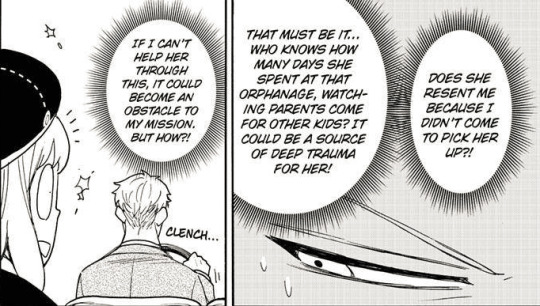
And there we have our first "for the mission" of this chapter 😂. Interestingly enough, it's not about her Stellas, or even her friendship with Damian. He's thinking that if she's traumatized, then the mission is in danger. And he's not wrong, but it's nice to see the "for the mission" directed at her well-being and nothing else.
And then we get the discussion between Henderson and the tutor-in-residence, which feels like the set-up for a longer plotline. Especially this gem:
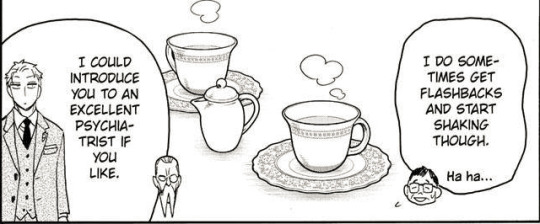
Henderson continues his trend of being a Loid Forger fanboy, but to me this seems like an excellent way for Endo to start giving more and more plot-relevant clients to Loid Forger. Perhaps even Melinda or Donovan Desmond at some point? One can only hope.
And then we have this panel:

I notice that Jeeves says "residence" instead of "rooms" or something similar. It looks like Melinda lives in a completely different house most of the time, then. An interesting window into the Desmond home life, and one I didn't quite expect. I wouldn't have thought that Donovan would allow such a thing. For a man so concerned with the Desmond family name he doesn't seem to care if people think familial relations are strained.
Poor kiddo, no wonder he seems happier in the dorms. I get that Melinda has her own stuff to deal with, but after last chapter's drama and how she went on about cooking for Damian, I expected her to at least eat with him. It's another comparison drawn between the Forger family and the Desmond family: the Forgers are all present at breakfast, and openly voice their concern for Anya, while Melinda straight up leaves the building and Damian only finds out she cooked from Jeeves.
The scenes with the other kids swooning over Damian, Becky, and Anya are cute, and of course getting another Stella goes to Anya's head a little bit. "Double Starlight Anya", really? 😂

This one made me chuckle out loud. And that little smirk on her face 😂
And Becky calling it like it is:
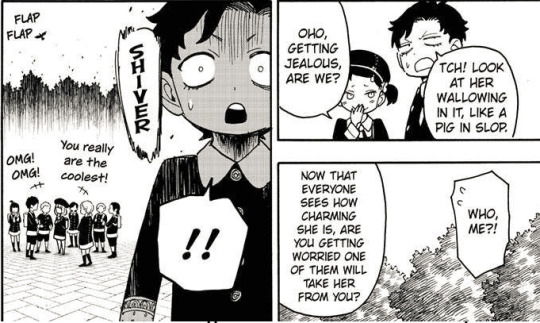
Also some of these rich Eden kiddos really need to touch grass once in a while. "Peasants" are people just like everyone else, and it's slightly appalling how these kids think that class makes a biological difference. As they get older, that can easily turn into bigotry.

The whiplash of Anya and Damian getting along somewhat to fighting to getting along again to fighting again is such an accurate depiction of little kids' friendships. Ten minutes is long enough to start and finish two separate wars.
And then we get this cute panel at the end, which sums all of that up nicely.
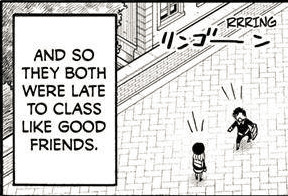
In conclusion, the fluff was strong in this chapter, but it wasn't a filler chapter, per se. The fluff was plot-relevant and moved the story along, as well as making a nice change from the last several chapters.
I do have a sneaking suspicion that this reprieve from the angst will be a brief one. My hunch is that either the next chapter or the one after that will take a hard left turn back into angst territory. See ya in two weeks!
#spy x family#spy x family spoilers#spy x family chapter 76#spy x family manga#lea over analyzes fictional stuff again#long post
47 notes
·
View notes
Text
Rings of Power live-blogging, LETS GO! (below the cut to avoid spoilers)
Just finished watching Ep1. There were some interesting parts, but it was… a little rushed? The writing had solutions just magically appear. I don’t know why 8 episodes seems to be the episode count for streaming seasons now but I dearly miss the days of 22 episode seasons. Tolkien is so damn long because his writing took breathing room ( sometimes too much). Wish the showrunners would keep that in mind.
Just as an aside, in the days of streaming do we really need this long of a recap? You know, the old adage of show rather than exposition. Just saying.
Think it could have been cool to do a cold open on Sauron/Halbrand’s face and then have a cut/ morph into other Sauron’s face. Would hype up his shapeshifting abilities from the get go.
Well that was brutal. Sauron is not great at campaigning obviously.
Also why does Sauron need to be crowned by Adar/the orcs. He’s a dark lord, the second to Morgoth. Just go in and BE A DARK LORD. Take that crown and slaughter anyone who says differently. Don’t gotta campaign for it, it’s not a democracy.
Et tu Brute? Real Caesar vibes.
Well that’s kinda revolting. The black squiggly thing not the bug eating.
Guess they needed a bigger boat.
Hot damn. Horse chase.
Oh. Damn. Really Galadriel? Also they’re like children fighting in front of dad.
OBVIOUS call back to Elronds mother there and interestingly casting Galadriel in the role that the Feanorians played.
Really hope the stranger is a blue wizard. It would be really lazy writing to make him Gandalf.
Why would you wear a METAL MASK IN THE DESERT?
ANOTHER obvious call back to Sam and Frodo. lazy writing.
There’s a good dogo. Bad good dogo? Good bad dogo?
Looks like a Nordic fishing village
BEN DANIELS
Check every warehouse, farmhouse, henhouse, outhouse, and doghouse! (Tommy Lee jones? The fugitive? No? I’ll see myself out)
Elrond operating from a whole bunch of family trauma right now.
Lazy writing. Well more like clumsy writing.
FOR THE LOVE OF GOD CAN WE GET SOME PROPER LIGHTING FOR NIGHT SCENES. can’t see shit.
Well something wanted Cirdan to change his mind.
I know they don’t know this but probs best to NOT antagonize Sauron.
Can Elrond just leave? Like isn’t he under arrest?
Oh Celebrimbor. Sigh.
#the rings of power#show: lord of the rings: the rings of power#lotr on prime#trop#trop season 2#lord of the rings: the rings of power#show: the rings of power#the rings of power season 2#kat liveblogs kinda
3 notes
·
View notes
Text
Fargo S5 E4: Insolubilia - Notable moments :)
Just some of the immediate things that popped into my head.
Spoilers under the cut!
I love love loved the opening scene! The Jack Skellington mask was so eerie and creepy. Joe Keery's movements with it, as well, made it feel as though Gator really was this calculating predator hunting its prey. Plus, the camera angles and lighting really built suspense. Usually in horror scenes it's over-the-top and they are relying on the anticipation of jump scares. But the opening scene really made the fear feel real.
Dot. This poor woman... Her looking back on her burning house was absolutely tragic. Juno Temple really conveyed through just her eyes how Dot felt like everything she had wanted and built for herself was slipping away. Dot wants to live happily with her family in a warm, cozy house. Yet she watched it all burn, and you could feel her pain. Plus the scene where she climbs into the hospital bed with her husband further drove that pain home. She was literally clinging to the one thing that had made her feel normal and loved for 9 years (besides her daughter, of course). Yet, even that was slipping away given that her past had caused him to get hurt (with permanent memory loss?).
The exchange between Gator and Dot is SO interesting. There's history there! Dot should have immediately been on the offense against him, yet she called him out. In previous episodes, we had Gator refer to her as Dot despite him knowing her real name. There seems to be some respect/care there deep down on both sides.
The timeline doesn't support Gator being Nadine/Dot's son - she's in her 30s and he's at LEAST in his 20s - but that also means that Gator would have grown up with Dot around for at least part of his life. She likely took on a mother-like role to him in some capacity. It's going to be really interesting to see if Dot will be able to find the soft Gator that the director eluded to (and that the Jack Skellington imagery eludes to) and help him turn his life around for the better.
The scenes with Ole Munch absolutely make my skin crawl, but his monologue in the bathtub was actually really powerful. Especially the part where he says that as soon as the people who are used to getting everything they want can't have something, they claim they have lost their freedom. (I'll leave it at that ^.^)
FINALLY confirmation that TWO of Roy's wives were MIA. I've had this theory since the first two episodes that Gator's mom had gone missing. Roy likes his wives young and submissive. Based on Dot/Nadine, as soon as those wives want control of their lives, Roy retaliates. I assume it is no different for his first wife which has to be Gator's mom. I've had it in my head that Gator witnessed his mother's murder as a boy but Roy has conditioned him ever since to believe that it was either an accident or deserved. I can't wait until more backstory is revealed!
Speaking of Roy...my goodness. I have never really watched anything where Jon Hamm had a major role before but I can definitely see why so many people praise his acting. Roy's last scene was so cold and calculating. It is such subtle acting and it's brilliant! We really got to see how evil Roy is and it was beautifully acted.
And because I find Gator to be such an interestingly layered character, I also loved to see his reaction to what Roy had done at the end. When he walked in, for a moment, he was no longer the tough guy, unphased by hurting others. There was a moment of shock and potentially disapproval on Gator's face when he saw the man writhing and slowly dying. I think it was a moment of "woah, did my father actually do that?" however, it was quickly replaced by turning that concern towards Roy. I like to think that the delivery of that scene hinted at the conditioning that Gator underwent during his upbringing to always put his father and his father's intentions as top priority.
We'll see how it all continues to unfold, but for someone who has never watched any previous seasons of Fargo, I'm absolutely loving the writing, acting and filming of the whole thing :)
#fargo season 5#fargo fx#fargo spoilers#fargo 5x04#gator tillman#joe keery#juno temple#jon hamm#fargo
19 notes
·
View notes
Text









District 9 (2009)
Film review #619
Director: Neill Blomkamp
SYNOPSIS: 28 years after an alien ship arrived on Earth hovering over Johannesburg, the alien inhabitants are confined to a section of the city known as "District 9." When the decision is made to "relocate them (forcibly) into a new camp outside of the city, Wikus van de Merwe is put in charge of leading the relocation, but when he is exposed to a strange substance, he finds himself slowly turning into one of the aliens, and is confined to be experimented upon. When he escapes, he seeks the only place where no one will look: district 9...
THOUGHTS/ANALYSIS: District 9 is a 2009 sci-fi film. 28 years after a spacecraft arrives to Earth, stopping to hover directly over Johannesburg. The alien inhabitants were cut free and settled in a sealed-off region of the city known as "District 9." Now, after resentment has grown by humans for the "prawns" living in the city, seeing them as responsible for crime and costly, the government has decided to relocate them to a camp outside of the city, and hired weapons company Multinational united (MNU) to oversee the relocation. The head of the company chooses his son-in-law Wikus van de Merwe to oversee the operation, and they begin the task of delivering notices of eviction to the residents (and relocating them whether they agree or not). Wikus is exposed to a strange substance that slowly turns him into a prawn, which leads to him being contained and used for experiments (particularly in using the alien's weaponry which only they can use). The film's method of storytelling and giving the backdrop to the film through reports, interviews and documentary footage is a bit chaotic but it nevertheless gets the background of what is going on well, and makes it interesting without devolving into just plain exposition. Being set in Johannesburg brings us a setting different from the usual settings of films in New York or Los Angeles, and the location obviously brings up echoes of apartheid with the prawns being fenced off from humans. The film doesn't really lean too much into that though: maybe it's fine with just the setting being enough to offer an analogue between fiction and reality, but it does feel like it's something that should be more of a focal point given the setting, but isn't. There's an element of satire that pervades over proceedings, which complicates things further, but the film is put together in such a way that you don't need to understand all the different levels it is operating on.
The film is at it's best when it offers a raw storytelling, told through all the different types of footage, offering flashes of lore and plot points from all angles that comes together quite nicely. The raw, messiness of the events of the film disrupts a more clean, sterile narrative, and keeps the stakes high. On a negative note, the film does have to fall into very cliché action scenes at points to move things along, which feel very out of place. The scene where Wilke escapes from the lab where he is held makes it seem a bit too easy, given that he was being held under maximum security, he manages to run up some stairs and out into the world with very little issue.
Wilke as a character starts off as a pencil-pusher promoted way beyond his ability, thanks to his Father-in-Law giving him the job (and maybe to take the blame for anything that inevitably goes wrong, the film leaves that open). Wilke seems to have a typical attitude to the alien "prawns," in that he clearly has a negative view of them. His attitude towards them, interestingly, doesn't really change much, even when he is turning into one himself, and he relies on them for help: he is always only thinking about himself. He doesn't really get much of a redemption arc, but he is certainly a victim of humanity, but in a different way to the prawns themselves. It's murky and not clear-cut but I suppose that's what makes it stand out in the sci-fi genre. The prawns themselves are quite convincingly portrayed and brought to life, and though we're not given too much backstory about them, we don't really need it to understand their motives.
Overall, District 9 offers something original enough in the genre, weaving together complex elements and footage to disrupt a typical narrative and brings its messiness to the forefront of the experience, without alienating the viewer. It's chaotic and messy, but clearly intentionally so. There are definitely parts where the film has to resort to more typical filming techniques and narrative points to bridge the gaps, but on the whole it offers enough to make it stand out in the genre, and entertaining enough regardless of how far you wish to dive into the satire and the sub-text of the story.
4 notes
·
View notes
Text
Tampopo by Itami Juzo - Blog 16
Tampopo by Itami Juzo, is a Japanese comedy film that tells a story about a widowed women who owns a small ramen shop called Lai Lai. She meets a truck driver named Goro who saves her son from school bullies and comes in to eat her food. After hearing Gun’s advice on her ramen, she begs him to help teach her to cook proper ramen. He agrees to teach her and film proceeds to show a series of events of her learning, developing, and improving her skills. She meets plentiful of new people who support her journey. In the end, she meets her goal and Lai Lai is renovated and renamed to Tampopo with many customers in line waiting to have her food.
My overall thoughts on this film was interestingly funny, gross, and yet heartwarming. The opening scene of the man in the white suit was neat as he was looking and talking towards the camera, as if he was talking to the audience watching the film. Once the main protagonist was introduced, the widowed ramen shop owner, the story proceeds to be a heartwarming learning journey, but occasionally there were scenes that seemed completely off topic from the main plot. These scenes felt similarly to ads as they abrupt and were related to food as well.
I found the first scene where a group of business executives visit a French restaurant for dinner. The executives ordered the same thing as the director, but there was one subordinate who orders a whole meal knowing the menu compared to all of them. This scene was very funny to me as each person, including the director, were red as an apple from embarrassment and looking down.
The next scene shows an older man having a sweet time with his mistress. I thought it was going to be a normal sexual interaction for the couple…but behold. We ended up watching them make out by exchanging an egg yolk until it popped in her mouth. Eventually the man has an encounter with an oyster diver and their make out scene was just as disturbing to me especially with his bloody lip. This man definitely has an interesting fetish for food.
Although not the last scene, I thought this one stood out to me as well. An older working man runs home to his dying wife, children, doctor and nurse. It was sad watching the man tell his wife not to close his eyes because he wanted her to keep living. He goes as far to shake her excessively and then he tells her to get up and go cook. I was surprised by this, but she immediately gets up and cooks dinner while struggling to keep her balance. After serving dinner to her kids and her husband, she smiles happily knowing they loved her cooking and she collapses. The doctor and nurse calls her time of death right away after checking her pulse. This was really sad moment. The father then tells his children to keep eating and cherish the last meal their mother made for them. They memorialize her through food, feeling the love she put in it before leaving them.

3 notes
·
View notes
Text
Queer books, day 26/30
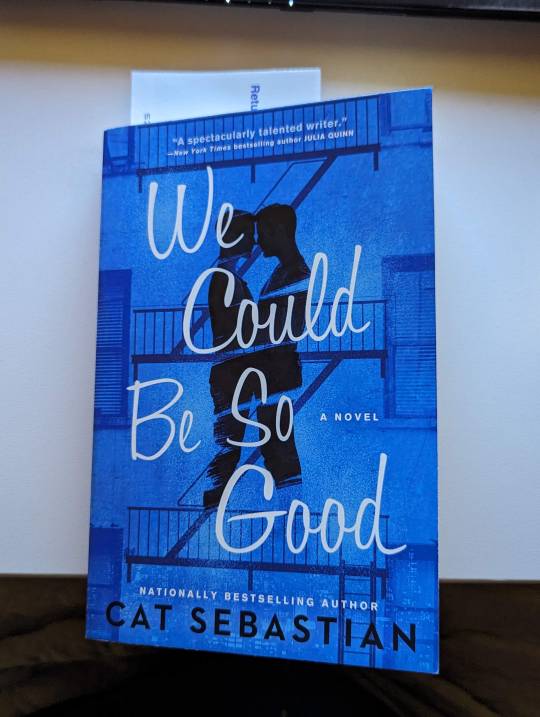
Oh boy okay hot off the presses with this one, here we go.
Nick and Andy are newspaper reporters in 1958 New York. The historical writing here is GORGEOUS, I just want to say. There are beatniks, there's Brooklyn, there's uptown. It's a richly imagined place and I feel like I could walk around in it. But okay, Nick and Andy meet at the newspaper and become best friends.
Nick is gay and very invested in hiding that fact from absolutely everyone else--he won't even talk to another gay man who works at the paper. He has good reason to be this way, having once been picked up on "vagrancy" charges (i.e. having gay sex in public) and having to have his older brother (who is a cop) bail him out. Nick doesn't like his older brother and he is deeply, deeply worried that everyone he loves will hate him if they find out he's gay, so he just keeps it quiet and lives this bifurcated life.
Andy, on the other hand, is the son of the paper's owner/publisher who is working as a reporter to gain experience before taking over. He's also a giant pile of abandonment issues and anxiety. He starts the novel ostensibly straight. After his fiancée leaves him (her name is Emily! and she's actually not a terrible person, so I forgive this), he moves in with Nick because he kind of hates being alone. And eventually, between reading the Village Voice and going to Some Like It Hot and Nick making him soup and a lot of self-examination, Andy realizes that he's actually bisexual, and what he really wants is…Nick.
A lot of this novel is about homophobia, surveillance, and coming out. Sometimes, coming out means telling friends about your desires, and sometimes, coming out is coming out to yourself. Admitting that you have been making specific choices that made your life easier, when maybe there were other choices that might make you happier. (Wow, that didn't strike a chord with me and my recent life at all, geez.)
Interestingly, for all the discussion of homophobia (and there is a lot, it's kind of a bummer), almost everything we see is related to self-surveillance. Yes, Nick talks about having been arrested and his fears of losing his job, but he doesn't really experience any negative repercussions during the story from any of the things he's afraid of (there are threats but no follow-through). It's also clear how limiting this anxiety is for him—how even when he is surrounded by Andy, Andy's father (who knows they're together), and his own nephew (who he just came out to), he still feels the need to come up with a work-related excuse to talk to Andy. And, like, that's realistic, but also a little heartbreaking, in among how sweet this book is, that Nick can't see his way through this forest. But he gets slowly better as the book goes along, and it seems like maybe, someday, he's going to get there. And for the time being, we wind up with characters who are both out in specific ways and respect each other's boundaries on that, which is nice.
To parallel this self-surveillance theme, there's also a plot about police surveillance and corruption. Just to remind you that ACAB. Even Nick's brother, who is at least trying to be decent to his son and even to Nick, is still kind of a bastard.
Key quote:
"Do you have a copy of Phaedrus?" he calls out. "Do I have a what?" "Plato's Phaedrus." "Oh yeah. Sure, it's right over by the-- No, I fucking don't have any Plato in my apartment, for fuck's sake, Andrew."
This book has non-explicit open-door sex scenes (really, they're sweet but tame). It also contains period-typical homophobia and reference to child abuse (off page and not explicit). It's also incredibly sweet and hopeful and funny. 10/10, go read it.
#cat sebastian#we could be so good#book review#queer books#queer fiction#gay romance novels#gay romance#thirty days of books
9 notes
·
View notes
Text
Past Lives - Coming to Terms with Closure
"You have to leave because you are you, and the reason I liked you is because you are you. And who you are is someone who leaves"
That resonated folks!
Big spoilers ahead for this review, of course. And important disclaimers- if you are looking for a light-hearted, funny, happy-ending flick, Past Lives is not for you. But if you happen to be broken-hearted, confused about being ghosted, or just wanting a refreshing, perhaps a more realistic and modern take to the conventional "star-crossed lovers," I think there is something in this film that you can take away, as much as I had.
In my opinion, Past Lives is quite flawless and underrated. The mood of the lighting, thoughtful setting choice, minimalistic editing, and character-focused camera angles were distinctively Korean. Without excessive dramatization, the screenplay told a love story interweaving the concept of In Yeon, a belief in fate and happenstance linked to associations and bonds shared across various lifetimes.
In a way, the film seemed to span various lifetimes, too. Beginning with Na Young (a.k.a. Nora) and Hae Sung kindling their first love. Balancing their playful first date in the park (looked upon by their mothers of course), their parting scene was set up wonderfully but not overtly emotional. But trust me, this set the stage for a build-up.
After what seemed like another lifetime (12 years), the childhood sweethearts managed to reconnect again, albeit virtually. This time, they formed a stronger, more romantic connection, but it was not meant to be again. As she was working hard for her dreams and immigrating to the United States, she asked for a break lasting for at least a year. And you know if you've experienced it, this is a common, yet awful kind of break-up. At this point, I hated her for being selfish. It was heartbreakingly unfair, but at the same time, it was a good watch as the acting was realistic.
And then they met again. After 12 more years. This time, Nora is married to Arthur, a Jewish author she encountered during a writing retreat. Nora immediately told Arthur about In Yeon, and he was easily seduced. They seem great for each other, though. He was loving, and she made his life bigger, so he said as they had one of the most honest moments of the film. This bed dialogue completely captures what makes this film a standout. It is empathetically confrontational. The characters opened up about their feelings, but they didn't end up blowing up on each other; rather, they console each other. Moving forward, they're all the better for it (clap, clap).
At this point, Nora has already met up with the visiting Hae Sung, and we have had the glorious New York skyline and the merry-go-round as the background scenes. As for the film's dramatic climax, I must say that that bar scene was a one-of-a-kind moment. It was painfully awkward for Arthur, of course; being on the same frame as your wife talking to her Korean soulmate. Remember, at this point those two have shared about three lifetimes already.
The scripting here is unforgettable, including the introductory quote I copied above. To add to this, Nora replied: "The Na Young you remembered doesn't exist here. But that little girl did exist, I left her behind with you." I think that is the thing about break-ups and what we should remember as we move on. The person we cared for doesn't exist for us anymore in the present. There is no point in dwelling.
At this point, I wish they could've just ended the film right here. They've given each other closure. I'm not faulting the ending though, when after a long moment of silence, Hae Sung asked Nora if she has any idea of what they would be in the next lifetime. I feel that prior to this question they both feel a sense of acceptance already. But at its core, this story is about gaining consolation in the In Yeon. They both believe in it, and moving forward, I think they will see things in a positive light. Interestingly, once they parted, Nora was seen inconsolably crying. What does this say you asked? In my opinion, it implies what many other break-up films try to tell you. "You'll turn your back on it and walk away, but it will stay with you."
To end, I would like to leave this idea or proposition that occurred to me just now as I am finishing this review. I think, as humans, there are certain things, feelings, and memories that stick with us, if not occasionally visit us here and there. It is the connection that we sometimes easily lose, or tragically put to an end. I think the concept of In Yeon is the stark opposite of that. A belief in fate, serendipity, acceptance, and optimism, if not a view of the fore- and hereafter, might be the antidote to who and what got away.
Plot/Screenplay - 10/10
Cinematography - 9.5/10
Acting - 9.25/10
Impact - 10/10
Overall Score- 9.6875/10






0 notes